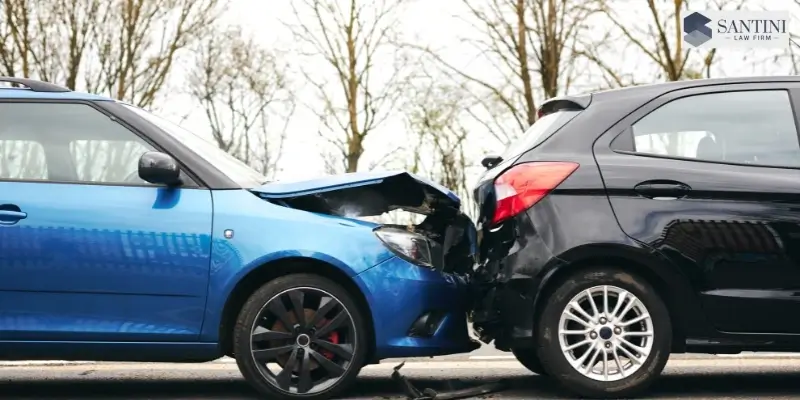What To Do After A Minor Car Accident in Florida?

Have you ever been sitting at a red light when suddenly someone taps your bumper from behind? Knowing what to do after a minor car accident in Florida can make all the difference between a smooth resolution and weeks of preventable headaches. With over 400,000 crashes reported annually on Florida roads (nearly 1,100 daily), even seemingly insignificant fender-benders require specific steps to protect yourself legally and financially. The moments following an accident can be disorienting, but staying calm and following Florida car accident steps systematically will help preserve your rights and ensure proper documentation.
And while the paperwork and procedures might seem overwhelming at first glance, having experienced guidance can transform the process. Santini Personal Injury & Car Accident Law helps accident victims understand their responsibilities at the accident scene, from properly documenting damage to navigating insurance claims processes unique to Florida’s laws.
We’ve noticed that most people don’t realize they should be taking photos after a car accident, even minor ones, which can become crucial evidence weeks later when memories fade and insurance adjusters start asking questions. Remember, what seems like a minor inconvenience today could develop into something more serious tomorrow, especially when dealing with insurance companies who aren’t always eager to pay what you deserve.
Key Takeaways
- Always prioritize safety first – check for injuries and move vehicles to a safe location if possible
- Document everything – take photos of all vehicles, damage, the scene, and road conditions
- Report accidents causing injuries or $500+ in damage (Florida law requirement)
- Get medical attention even if you feel “fine” – injuries often appear days later
- Notify your insurance promptly but stick to facts only when describing what happened
What Should I Do Immediately After a Minor Accident?
First things first – breathe. Staying calm after an accident helps you think clearly about the Florida car accident steps you need to follow. Check yourself and passengers for injuries before doing anything else. Even minor fender-benders can cause whiplash or other hidden injuries.
If it’s safe and the vehicles are operational, move them to the shoulder or nearest safe location. Florida law actually requires this when possible to prevent secondary crashes. Leaving cars blocking traffic creates a hazardous situation for everyone.
Turn on your hazard lights and set up warning triangles if you have them. And if anyone seems injured, even slightly, call 911 immediately.
The National Highway Traffic Safety Administration recommends staying at the scene until all necessary information has been exchanged and any required reporting is complete. Leaving prematurely could be considered a hit-and-run – a serious offense in Florida that can result in license suspension, fines, or even criminal charges.
Documenting and Exchanging Information
This part’s crucial. Your phone is your most powerful tool right now. Start taking photos after a car accident immediately – before vehicles are moved if possible. Capture wide shots of the overall scene, close-ups of all damage, license plates, and any relevant road conditions or signs.
When exchanging information with the other driver, collect:
- Full name and contact information
- Insurance company and policy number
- Driver’s license number
- Vehicle make, model, and license plate
- Location of the accident
Be thorough but concise. No need for lengthy conversations about fault.
Witnesses can disappear quickly, so gather contact information from anyone who saw what happened. Their testimony might become invaluable later (especially if the other driver’s story mysteriously changes).
For preserving evidence after an accident, jot down quick notes about what happened while it’s fresh – weather conditions, time of day, what you observed before impact. These details get fuzzy fast.
Florida’s Reporting Requirements
Know when to call the cops.
Florida car accident laws require you to report accidents resulting in injuries or apparent property damage of $500 or more. But honestly? That $500 threshold is ridiculously low – even minor bumper damage typically exceeds this amount. When in doubt, report it.
To properly handle reporting minor accidents, you should:
- Call the non-emergency police line if there are no injuries
- Wait for officers to arrive and provide factual information only
- Get the officer’s name and badge number
- Ask how to obtain the accident report (typically available 10 days after the incident)
The Florida Highway Safety and Motor Vehicles Department states that you must file a crash report within 10 days if police didn’t respond to the scene. Skip this step and you might face license suspension.
Your responsibilities at the accident scene include providing accurate information to authorities – but stick to the facts. Don’t speculate about what happened or admit fault. Just ain’t worth it.
Medical Checkups: Even When You Feel Fine
This isn’t optional.
Many accident victims skip seeking medical attention after an accident because they “feel okay” – making a big mistake. Adrenaline masks pain, and symptoms of whiplash and other soft tissue injuries often appear 24-72 hours after the crash.
Get checked within 14 days of your accident, or you risk losing eligibility for Personal Injury Protection (PIP) benefits under your Florida auto insurance. Those benefits? They cover up to $10,000 of your medical expenses regardless of fault.
Medical documentation after an accident creates an official record linking your injuries to the crash – something insurance companies love to dispute when records are spotty or delayed.
Common injuries in minor accidents include:
- Whiplash and neck pain
- Shoulder/back strains
- Mild concussions
- Knee injuries from dashboard impact
Your body absorbs tremendous force even in a 10-mph collision. Don’t gamble with your health by skipping medical evaluation, a decision that might haunt you weeks later when pain suddenly appears and treatment becomes more complex.
The Florida Department of Health provides resources for finding appropriate medical care following an accident, including specialists familiar with documenting accident-related injuries properly.
Remember: some issues like herniated discs or TBIs (traumatic brain injuries) can lurk beneath the surface with minimal early symptoms. Better safe than permanently injured.
Frequently Asked Questions About Minor Car Accidents in Florida
Do I need to call the police for a minor accident in Florida?
Absolutely. Florida law requires you to report accidents that result in injuries or property damage over $500. That $500 threshold? It’s practically nothing in today’s world, even a scratched bumper can cost more than that to repair.
If there are no injuries, you can call the non-emergency police line. Always get the responding officer’s name and badge number, and ask how to obtain a copy of the accident report (usually available about 10 days later).
What information should I exchange with the other driver after a minor car accident in Florida?
What information should you exchange with the other driver? You’ll need to collect their full name, contact information, insurance details (company and policy number), driver’s license number, and vehicle information including make, model, and license plate. Keep it professional at the scene, focus on gathering ALL the info, and avoid discussing who’s at fault. Stick to the facts only. Here is what to do if the at-fault driver is uninsured.
Should I see a doctor if I don’t feel hurt after a minor car accident?
Yes, you absolutely should see a doctor after a minor car accident in Florida, even if you feel perfectly fine. Here’s why: adrenaline often masks pain immediately after an accident. Many injuries, especially whiplash and soft tissue damage, don’t show symptoms until 24-72 hours later.
Plus. Florida’s PIP insurance has strict rules. You must seek medical attention within 14 days of the accident to maintain eligibility for those benefits. Skip this step? You could lose up to $10,000 in medical coverage.
Better safe than sorry.
What photos should I take after a minor car accident in Florida?
What photos should you take after a minor car accident in Florida? Your camera roll should include:
- Wide shots showing both vehicles’ positions before moving them (if safe)
- Close-ups of ALL damage to both vehicles
- License plates of all involved vehicles
- The entire accident scene from multiple angles
- Any skid marks or debris on the road
- Traffic signs or signals in the area
- Weather and road conditions
- Any visible injuries (if applicable)
Think of it this way, you can never have too many photos, but you can definitely have too few when you’re trying to prove what happened later.
How long do I have to report a car accident to my insurance company?
Most insurance policies require “prompt” reporting, which basically means ASAP. Don’t wait.
I generally recommend calling your insurance company within 24 hours of the accident. Delaying could give them grounds to deny your claim, especially if the delay somehow prejudiced their investigation. Just remember when you call to stick to the basic facts of what happened without elaborating or accepting blame.
Can moving my car after a minor accident affect my insurance claim?
No. Florida law actually requires you to move your vehicle if it’s drivable and blocking traffic. Keeping cars in travel lanes creates dangerous conditions and could cause secondary accidents.
Just be sure to take plenty of photos before moving anything if it’s safe to do so. These photos preserve the original positions of the vehicles, which might help determine fault later. Then move to the shoulder, a nearby parking lot, or another safe location to exchange information.
What happens if the other driver admits fault but then changes their story?
This happens more than you’d think. What happens if the other driver admits fault but then changes their story? Well, this is exactly why documentation is crucial.
Without evidence, it becomes a “he said, she said” situation. That’s why you should:
- Take detailed photos
- Get witness contact information
- File a police report
- Write down what the other driver said as soon as possible (including any admission of fault)
- Avoid discussing the accident on social media
Conclusion
Have you ever stood beside your dented vehicle on a Florida roadway, pulse racing, wondering if you’ve forgotten something critical in the post-accident chaos? Even “minor” accidents leave most people feeling shaken and uncertain. I’ve seen clients arrive at our office clutching hastily written notes on gas station receipts, worried they’ve already compromised their case because nobody prepared them for that disorienting moment.
The fear of making mistakes with insurance companies is real, especially when you’re still processing what happened. Look, what many don’t realize is that Florida’s no-fault system has specific documentation requirements that, when overlooked, can create headaches for months afterward (and those seemingly minor injuries sometimes develop into something more serious after the adrenaline wears off).
At Santini Personal Injury & Car Accident Law, we understand that the hours and days following even a minor collision are filled with questions and concerns that shouldn’t be navigated alone. We’ll help you understand your obligations under Florida’s Personal Injury Protection coverage, ensure proper documentation of both property damage and potential injuries, and communicate directly with insurance adjusters so you don’t have to.
When you’re feeling overwhelmed by paperwork and procedures, remember that guidance is just a phone call away.
Contact us today, and let’s transform this stressful situation into a manageable process with someone experienced handling the complicated parts while you focus on getting back to normal.
Let Us Get You Started In The
Right Direction
Fields marked with an * are required


